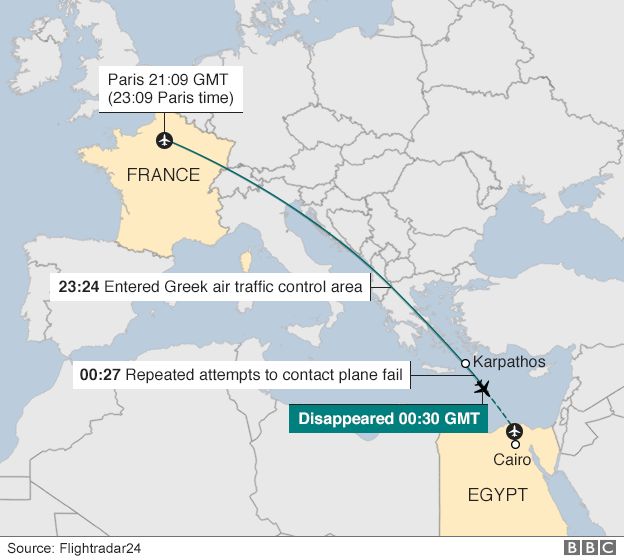A massive search is continuing for a second day for an EgyptAir plane that disappeared over the Mediterranean.
Greek, Egyptian, French and UK military units are taking part in the operation near Greece’s Karpathos island.
Flight MS804 was en route from Paris to Cairo with 66 passengers and crew when it vanished early on Thursday.
Greece said radar showed the Airbus A320 had made two sharp turns and dropped more than 25,000ft (7,620m) before plunging into the sea.
Egypt says the plane was more likely to have been brought down by a terrorist act than a technical fault.
Most of the people on board Flight MS804 were from Egypt and France. A Briton was also among the passengers.
So far, no wreckage or debris from the aircraft has been found.

Egyptian military ships, assisted by several other nations, are scouring the vast area for any signs of the plane’s wreckage
Initial reports late on Thursday, based on Egyptian officials’ comments that wreckage had been found, later proved unfounded.
Greece’s lead air accident investigator Athanasios Binis said items including lifejackets found near Karpathos were not from the Airbus A320.
“An assessment of the finds showed that they do not belong to an aircraft,” he said.
Egyptian President Abdel Fattah al-Sisi has ordered the country’s civil aviation ministry, army-run search-and-rescue centre, navy and air force to take all necessary measures to locate the wreckage.
The French air accident investigation bureau has despatched three investigators, along with a technical adviser from Airbus, to join the Egyptian inquiry.

In France, the focus is on whether a possible breach of security happened at Paris’ Charles de Gaulle airport.
Security was already tight, and under review, after last November’s attacks by jihadist militants in the French capital.
Since then, some airport staff have had security clearance revoked over fears of links to Islamic extremists.
Eric Moucay, a lawyer for some of those employees, told the BBC that there had been attempts by Islamists to recruit airport staff.
“That is clear. There are people who are being radicalised in some of the trade unions etc. The authorities have their work cut out with this problem,” he said.
No response
Flight MS804 left Paris at 23:09 local time on Wednesday (21:09 GMT) and was scheduled to arrive in the Egyptian capital soon after 03:15 local time (01:15 GMT) on Thursday.
On the plane were 56 passengers, seven crew members and three security personnel.
Greek aviation officials say air traffic controllers spoke to the pilot when he entered Greek airspace and everything appeared normal.
They tried to contact him again at 02:27 Cairo time, as the plane was set to enter Egyptian airspace, but “despite repeated calls, the aircraft did not respond”. Two minutes later it vanished from radar.
Greek Defence Minister Panos Kammenos told reporters: “The picture we have at the moment on the accident as it emerges from the Greek air force operations centre is that the aircraft was approximately 10-15 miles inside the Egyptian FIR [flight information region] and at an altitude of 37,000 feet.
“It turned 90 degrees left and then a 360-degree turn toward the right, dropping from 37,000 to 15,000 feet and then it was lost at about 10,000 feet.”
Egyptian Aviation Minister Sherif Fathi said: “Let’s not try to jump to the side that is trying to identify this as a technical failure – on the contrary.
“If you analyse the situation properly, the possibility of having a different action, or having a terror attack, is higher than the possibility of having a technical [fault].”
In October an Airbus A321 operated by Russia’s Metrojet blew up over Egypt’s Sinai Peninsula, with the deaths of all 224 people on board. Sinai Province, a local affiliate of the Islamic State jihadist group, said it had smuggled a bomb on board.
French President Francois Hollande said: “We will draw conclusions when we have the truth about what happened.
“Whether it was an accident, or whether it was – and it’s something that is on our minds – terrorism.”
Flightradar24 listed details of the plane’s journey on Wednesday which showed it had flown from Asmara, in Eritrea, to Cairo, then on to Tunis, in Tunisia, before heading, via Cairo, to Paris.
Aviation analyst Alex Macheras told the BBC that Airbus A320s were regularly used for short-haul budget flights and had “an amazing safety record”.
BBC
 Q FM Africa's Modern Radio
Q FM Africa's Modern Radio